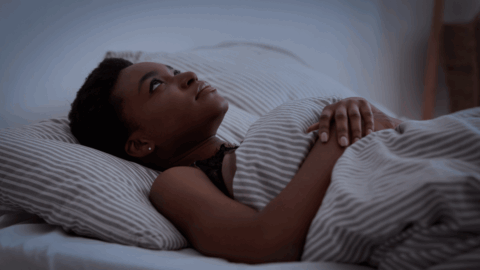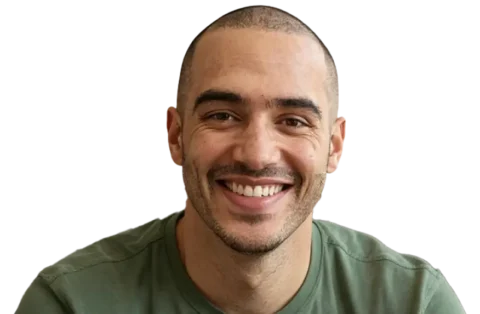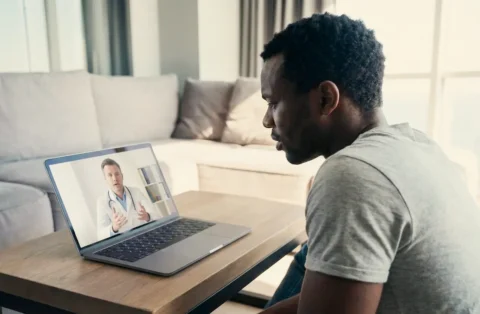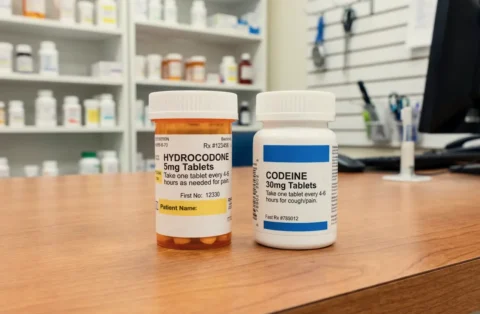What you’ll learn
This guide explores how Suboxone® affects your sleep and what you can do about it. You’ll learn what’s normal during treatment, when to talk to a provider, and how to get better rest without risking your recovery.
If you’re starting Suboxone®, sleep might not be at the top of your mind. But for some people, it becomes something they notice. Maybe you feel more tired than usual. Or it takes a little longer to fall asleep. Some people mention more vivid dreams.
If you’re wondering, “Will Suboxone® help me sleep?” or “Will it keep me up?” You’re definitely not alone. These are questions we hear often, and they make sense. Any change to your routine or your body can shift how you sleep, especially early in recovery.
The good news is, most sleep changes don’t last long. And once your treatment starts to settle in, many people find their rest improves along with their overall well-being.
At QuickMD, we’ve helped thousands of patients through the early stages of Suboxone® treatment. We understand what to expect and how to help. That’s why we’ve created this article to walk you through how Suboxone® works, what kind of sleep changes people notice, and what you can do to feel more rested and supported along the way.
When you’re in recovery, both your progress and your sleep matter. You don’t have to choose between the two. Let’s break it down.
How Suboxone® can affect your sleep early on
Starting Suboxone® is a major shift. Your body is moving from withdrawal toward stability, and sleep may feel different during the adjustment. For some people, that change brings relief. For others, it can make rest a little harder, at least at first.
Early in treatment, many people find that Suboxone® helps them sleep better. By easing symptoms like restless legs, anxiety, and night sweats, it creates enough stability for real rest to return, sometimes for the first time in a long time.
But for others, especially in the first week or two, sleep can feel off. You might have trouble falling asleep, wake up frequently, or feel overly tired during the day. This doesn’t mean something is wrong. Most of the time, it’s just your brain and body finding a new rhythm. With time, it really does get better.
Some of this may be tied to brain chemistry. One animal study found that buprenorphine (the main ingredient in Suboxone®) reduced adenosine, a brain chemical that supports deep sleep. This might explain the vivid dreams or restless nights some people report early on.
Lower adenosine can make it harder to fall into deep sleep, and may cause you to wake up more easily.
That said, these effects usually improve as your brain adjusts and finds a new balance, especially once your dose is stabilized. If your sleep feels off, it doesn’t mean Suboxone® isn’t working. It just means your system is still adapting. This part of the process is common and temporary. It’s a sign things are moving forward, and it’s worth every bit of the effort.
There are also things you can do to make it easier. We’ll walk through some of the best ways to support your sleep while your treatment takes hold.
Why Suboxone® can affect sleep and dreams
To understand why Suboxone® can impact your sleep, it helps to look at how it works in the brain.
Suboxone® combines two medications: buprenorphine, a partial opioid agonist, and naloxone, an opioid blocker. Together, they reduce withdrawal symptoms, lower cravings, and help stabilize your nervous system after long-term opioid use.
But opioids (whether full or partial) affect the same brain pathways that help regulate sleep, mood, and alertness. One of those systems involves noradrenaline, a brain chemical that helps keep you alert.
Normally, opioids lower noradrenaline levels, which is why people often feel drowsy while using them. But over time, the brain tries to compensate by producing more of it.
So when you start Suboxone®, especially after stopping other opioids, that extra noradrenaline can make you feel restless, especially at night. This is part of why some people report trouble sleeping or feeling wide awake during early treatment.
Here are a few ways Suboxone® can influence your sleep cycle:
- It can make you feel drowsy. Some people find that Suboxone® makes them feel sleepy, especially after taking it. This is more common in the first few weeks of treatment or if your dose is too high.
- It can interfere with REM sleep. REM (rapid eye movement) sleep is the stage where dreaming happens. Opioids are known to suppress REM sleep, which can lead to fewer dreams, or sometimes more vivid, intense, or even unpleasant ones as your body adjusts.
- It can throw off your circadian rhythm. If your sleep-wake schedule has already been disrupted by opioid use or withdrawal, starting Suboxone® can temporarily shift things around before helping you settle into a more regular rhythm.
Feeling too tired or not tired enough? Both are possible depending on your dose, your body, and where you are in treatment.
Suboxone® can help with sleep by easing withdrawal symptoms that make it nearly impossible to rest. If you’ve been waking up sweating, pacing with anxiety, or jolting awake with restless legs, Suboxone® can take the edge off. As your body stabilizes, many people find their sleep gets deeper and more consistent.
While it’s not a traditional sleep aid, think of it as a “comfort med” or “helper med” that helps ease the symptoms keeping you up at night. As your system adjusts and your withdrawal symptoms calm down, many people notice that their sleep becomes deeper and more consistent.
However, in some cases, Suboxone® may disrupt sleep. You might feel wired at night, or too sleepy during the day. Some say they feel emotionally flat or overly drowsy.
Here’s why that happens:
- Buprenorphine, one of the active ingredients, is a partial opioid agonist. It affects the same receptors as drugs like heroin or oxycodone, but in a gentler, more controlled way.
- Naloxone, the other component, isn’t absorbed much unless injected. But in rare cases, sensitive individuals might notice subtle effects, especially if their dose is too high.
- Sleep cycles take time to regulate after opioid use. Even after physical withdrawal ends, your body still needs to relearn how to sleep without the ups and downs of short-acting opioids.
So while Suboxone® doesn’t directly “cause” insomnia or fatigue for most people, it can shift how you experience sleep, especially in the first few weeks. But, there are ways to try to help sleep and Suboxone® work together more effectively.
What can you take for sleep while on Suboxone®?
If Suboxone® is messing with your sleep, it’s natural to wonder what you can safely take. The good news is, there are a few options that are generally considered safe. But you need to approach this carefully, especially during your recovery from opioids.
Many people recovering from opioid use turn to over-the-counter options, hoping to ease symptoms like insomnia, anxiety, or restless sleep. However, not all supplements are created equal, and some may not be safe with Suboxone®.
In our guide to supplements during opioid withdrawal, we break down which ones show real potential and which ones could do more harm than good.
For sleep, a few stand out:
- Magnesium: This may support muscle relaxation and reduce restless legs or cramping at night. Magnesium glycinate is a gentler form that’s less likely to upset your stomach.
- Melatonin: It can help reset your sleep-wake cycle, especially if Suboxone® has shifted your natural rhythm. Many people use it short-term as they adjust.
- L-theanine: An amino acid found in green tea, might ease anxiety and support sleep quality. It hasn’t been studied specifically for opioid treatment, but some people report that it helps them feel calmer and more grounded at night.
Of course, always run any new supplement by your Suboxone® provider. Some, like valerian root or CBD, can have unpredictable effects or interact with medications. Others, like kratom or proprietary detox blends, are best avoided altogether.
And while it’s tempting to rely on a supplement, don’t underestimate the power of some simple habits to help you unwind.
- Try guided meditation or breathing exercises before bed to help quiet your mind.
- Avoid screens and heavy meals for an hour or two before sleep.
- Stick to a consistent bedtime and wake-up schedule, even on weekends.
- Consider gentle stretches or light yoga to ease muscle tension.
- Keep your sleep environment cool, quiet, and dark.
Want more ways to manage symptoms during treatment? Check out our Quick Tips Blog for simple, practical guidance on everything from supplements to Suboxone® side effect support. We break it down so it’s easier to focus on what actually helps.
When sleep problems might mean something else
It’s easy to assume that Suboxone® causes sleep problems, but that’s not always the case. Especially early in recovery, trouble sleeping can have more than one root cause.
If you’ve recently started Suboxone® or changed your dose, your body may still be adjusting. But if those problems stick around, it’s worth looking at the bigger picture.
Mental health and sleep are deeply connected
Anxiety, depression, and PTSD often show up alongside opioid use disorder, and for many people, these issues were part of the picture long before treatment started. It’s not uncommon to use opioids as a way to cope. But once you stop using, those underlying symptoms can come back stronger than before.
Your body might feel tired, but your mind won’t shut off. You might feel physically tired but mentally wired: racing thoughts, night sweats, or anxiety can keep you awake. These symptoms may feel like withdrawal but often reflect deeper mental health needs.
One study found that over 70% of people on buprenorphine still had sleep problems years into treatment, but these weren’t tied to their dose. Treating sleep alongside depression may help people stay in care longer.
At QuickMD, we offer virtual counseling alongside Suboxone® care, so you can talk to someone who understands both sides of the recovery process, without leaving home. If your sleep is still off and you’re not sure why, this can be a helpful place to start. If you’re struggling, it’s not a sign of weakness. It’s a sign your body and mind are asking for care, and that’s precisely what recovery is for.
Withdrawal or other medications could be a factor
Sleep can also be disrupted if you’re still in the early phases of treatment and your Suboxone® dose isn’t quite right. Waking up sweaty, achy, or anxious may point to mild withdrawal, especially overnight.
Other medications, like antidepressants, stimulants, or certain supplements, may also affect your sleep cycle or interact with Suboxone® in ways that make restful sleep harder to get.
If your sleep hasn’t improved after a few weeks, or if it’s getting worse, that’s a good time to check in with your QuickMD MAT provider.
Suboxone® and sleep: what to keep in mind
If you’re taking Suboxone® and not sleeping well, you’re not the only one, and it doesn’t mean something’s gone wrong. For most people, it gets better as your body and brain adjust.
If your sleep’s been off for more than a few weeks, don’t just wait it out. Talk to your QuickMD provider. You can try simple things, like shifting your dose time, trying safe supplements, and adjusting your habits, to make a difference without derailing your recovery.
Frequently asked questions about Suboxone® and sleep
When should I take Suboxone® for better sleep?
Everyone responds a little differently, but many people find that taking Suboxone® in the morning works best. Taking it too late in the day may cause restlessness or interfere with falling asleep.
If you feel wired or sleepy after your dose, talk with a QuickMD provider. They can help you find the best timing based on how your body responds.
Can I take melatonin every night with Suboxone®?
Melatonin is generally considered safe and non-addictive, and many people on Suboxone® use it occasionally for help with sleep.
But using it every night can lead to reduced effectiveness over time or dependency on it as a sleep cue. If you’re relying on it nightly, it’s worth checking in with your provider to make sure it’s the right long-term strategy for you.
Is it safe to take sleep medication with Suboxone®?
That depends on the type. Some sleep medications, especially benzodiazepines (like Xanax or Ativan), can be extremely dangerous when combined with Suboxone® due to the increased risk of respiratory depression. Never start a sleep aid, prescription, or over-the-counter medication without notifying your QuickMD provider.




